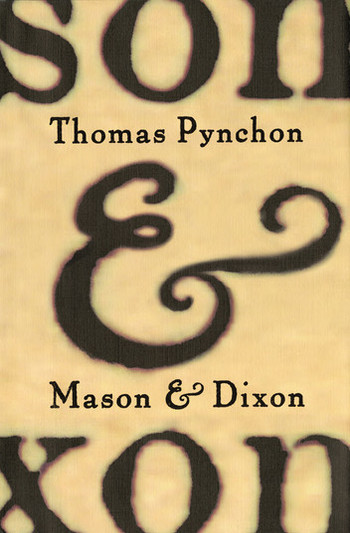
Mason & Dixon is a 1997 postmodern historical fiction novel by Thomas Pynchon. Another Doorstopper novel by Pynchon, and more of a contrast to Gravity's Rainbow in terms of characters and storytelling.
Mainly a re-imagining of two British astronomers; Charles Mason and Jeremiah Dixon. Best remembered for running the boundary between Pennsylvania and Maryland that has come to be known as the Mason-Dixon Line. The novel’s plot is told in a frame narrative by Reverend Wicks Cherrycoke, “a clergyman of dubious orthodoxy, who attempts to entertain and divert his extended family on a cold December evening—partly for amusement, and partly to keep his coveted status as a guest in the house.”
Written in a parodic 18th-century variant of the Pynchon style, it is a traveller's tall tale that follows the astronomer-surveyors Charles Mason and Jeremiah Dixon through South Africa to the South Atlantic and across America, where they plotted their famous Line shortly before the War of Independence.
As with all Pynchon's books, Mason & Dixon is framed as a historical novel but takes place in a world tilted several degrees from real event: "It may be the Historian's duty to seek the Truth," one character observes, "yet must he do ev'rything he can, not to tell it." Accordingly, our heroes smoke dope with George Washington, encounter an omnipotent, supersonic version of Vaucanson's mechanical duck, are visited by ghosts, and encounter Feng Shui masters, were-beavers, UFOs and much more besides.
It's a hymn to the American unknown, or as Pynchon writes, to "all that may yet be true … til the next Territory to the West be seen and recorded, measur'd and tied in, back into the Net-Work of Points already known, that slowly triangulates its Way into the Continent, changing all from subjunctive to declarative, reducing Possibilities to Simplicities that serve the ends of Governments, – winning away from the realm of the Sacred, its Borderlands one by one, and assuming them unto the bare mortal World that is our home, and our Despair.
Oh yes. And it’s gigantic and complex of course.
Like many of Pynchon's novels, it also has its own wiki![]() , which may prove to be a helpful resource for newcomers.
, which may prove to be a helpful resource for newcomers.
The novel contains examples of:
- Aloof Leader, Affable Subordinate: Mason is the former, Dixon is the latter, although it's really his affability that makes Mason cast him in a subordinate position (that and the fact that Mason is a Royal Astronomer and Dixon comes from a more humble background).
- Antiquated Linguistics: The entire novel is written in a pastiche of eighteenth-century writing that successfully averts Ye Olde Butcherede Englishe, though the dialect is somewhat exaggerated. This makes it one of his more difficult novels for newcomers, though some critics consider it to be one of the novel's strengths; critic Harold Bloom has cited it as the most sublime novel of the 20th century.
- Door Stopper: The 2004 paperback edition consists of a whopping 773 pages. Others have similar page counts.
- Erudite Stoner: George Washington, of all people, who smokes hemp with Mason and Dixon. Becomes Stoners Are Funny when they all get the munchies, and Martha produces an enormous tray of baked goods for them.
- Foregone Conclusion: Anyone who does some basic research into the lives of Mason and Dixon will not be surprised by the fact that both are dead by the time the novel ends, and the line is never completed. Also, while it's not stated whose funeral it was that the Reverend came to Philadelphia for, it becomes clear further into the book that it was Mason's.
- Historical Domain Character: The eponymous duo, of course, but plenty of other historical personages make appearances as well.
- Kudzu Plot: Although not as complicated overall as some of Pynchon's other work, Mason and Dixon's relatively linear journey still stumbles across tons of sub-plots, most prominently an ambiguously real conspiracy theory involving the Society of Jesus that is never explained. Further complicating matters is the fact that the story is told by multiple people, all of whom may be lying.
- Lighter and Softer: Much more heartfelt, humane, and warmer in contrast to Pynchon’s early works including V., The Crying of Lot 49 and Gravity’s Rainbow.
- Only Sane Man: Usually Mason, occasionally Dixon, and sometimes no one.
- Purely Aesthetic Era: Mason and Dixon go to see Benjamin Franklin play his Glass Harmonica in a bar, and Pynchon describes it as if Franklin is DJing at a club. Franklin even exchanges his half-moon glasses for blue-tinted ones, like a 90s DJ.
- Those Two Guys: It's right in the title.
- World of Snark: Mason and Dixon are frequently at the wrong end of snarking from nearly everyone they meet, including colonists, revolutionaries, slaves, historical figures, supernatural creatures and their own superiors, teachers and crew. They tend to involve a surprising amount of erudition. The duo does get in on it as well, though less often, and usually to each other.
